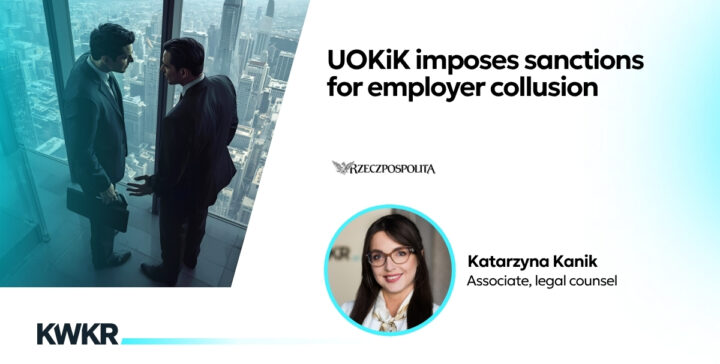Katarzyna Kanik for Rzeczpospolita: “UOKiK imposes sanctions for employer collusion”
In the Polish labor market, there are increasing instances of unofficial arrangements between companies that block employee mobility and freeze wages. Such practices – from agreements not to hire each other’s staff to jointly setting pay levels – may result in severe sanctions from the Office of Competition and Consumer Protection (UOKiK). Katarzyna Kanik writes in Rzeczpospolita about the growing threat of liability for employer collusion. Read the article in Polish here!

What employer collusion is and how it works
Zmowy pracodawców to nieformalne lub formalne porozumienia między przedsiębiorcami, których celem jest ograniczenie konkurencji o pracowników. Najczęściej przybierają one dwie formy: umowy „no-poach” (zakaz rekrutowania pracowników konkurencji) oraz porozumienia dotyczące polityki wynagrodzeń. W praktyce firmy mogą powstrzymywać się od kontaktowania z pracownikami innych firm, odrzucać CV kandydatów z określonych przedsiębiorstw lub wprowadzać „okresy karencji” uniemożliwiające zatrudnienie u konkurenta. Takie działania prowadzą do stagnacji płac, spadku mobilności zawodowej i osłabienia bodźców do rozwoju kompetencji.
UOKiK initiates proceedings
The Office of Competition and Consumer Protection is actively investigating cases of employer collusion, treating them almost like classic cartels. In October 2025, UOKiK launched an investigation against companies from the logistics sector – Krotrans Logistics, C.H. Robinson, and Mena P.M. – regarding the use of temporary blocks for drivers. Earlier, the President of UOKiK brought charges against Jeronimo Martins Polska (Biedronka), 32 transport companies, and eight managers in connection with suspected restrictions on the ability of drivers to move between carriers. Similar proceedings concerned the Dino chain and its cooperating companies. These cases show that such practices affect both large market players and their contractors in supply chains.
Legal and business consequences
Companies participating in employer collusion expose themselves to double liability: administrative (UOKiK sanctions) and civil (employee claims for compensation for lost wages). Such agreements violate the constitutional freedom to choose one’s profession and place of work and the right to fair remuneration. Importantly, the entire company is liable for prohibited agreements, even if the arrangements were made unofficially by lower-level employees, for example HR specialists during an informal conversation at an industry conference. The consequences include not only financial penalties but also a serious reputational crisis that may undermine the trust of employees, clients, and contractors.
How to avoid the risk
To prevent violations, entrepreneurs should implement compliance programs that educate management and HR departments about the risks associated with employer collusion. It is crucial to make employees aware that even informal exchanges of information with representatives of competitors about salaries, employment policies, or staffing plans may be considered a prohibited agreement. Companies should clearly define the rules of contact with other businesses, prohibit the exchange of sensitive HR information, and provide for internal sanctions for violating these rules.
What employer practices may be considered illegal collusion restricting competition? What legal and financial consequences threaten companies for participating in agreements concerning employment and pay? How can entrepreneurs protect themselves from UOKiK accusations of employer collusion?
Katarzyna Kanik answers these and many other questions in her article published in Rzeczpospolita.

